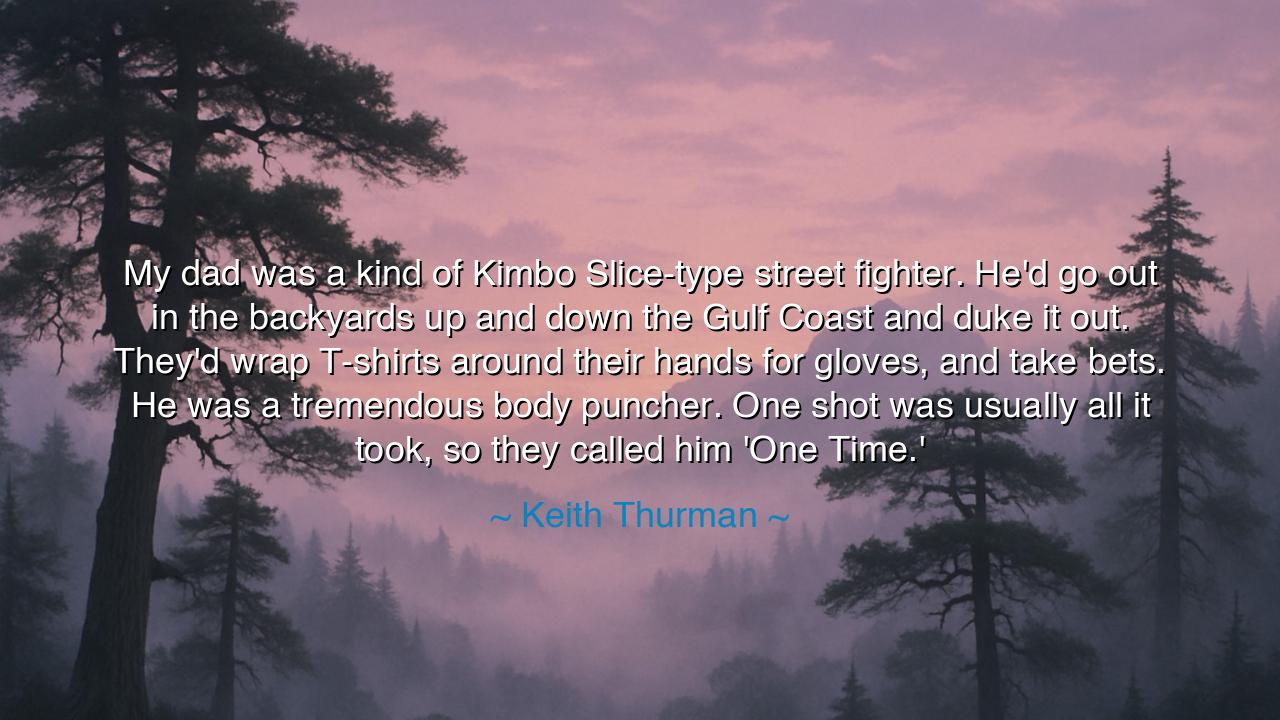
My dad was a kind of Kimbo Slice-type street fighter. He'd go out
My dad was a kind of Kimbo Slice-type street fighter. He'd go out in the backyards up and down the Gulf Coast and duke it out. They'd wrap T-shirts around their hands for gloves, and take bets. He was a tremendous body puncher. One shot was usually all it took, so they called him 'One Time.'






“My dad was a kind of Kimbo Slice-type street fighter. He'd go out in the backyards up and down the Gulf Coast and duke it out. They'd wrap T-shirts around their hands for gloves, and take bets. He was a tremendous body puncher. One shot was usually all it took, so they called him 'One Time.'” — so spoke Keith Thurman, a world champion boxer, recalling the raw legacy of his father. His words pulse with the rhythm of heritage, strength, and survival — the kind of story that belongs not only to one man, but to the ancient lineage of warriors who carved their worth with their hands, who fought not for fame, but for dignity and pride. Beneath the grit of this tale lies a truth both timeless and sacred: that the fire of greatness is often inherited, not through comfort or fortune, but through the struggle of those who came before.
In this memory, the father becomes not merely a fighter, but a symbol of raw will, a man who entered the ring of life armed with nothing but his courage. The image of backyards turned into battlefields, of T-shirts wrapped as makeshift gloves, is as ancient as humankind itself. It recalls the spirit of the early gladiators, of men who fought not under the gaze of kings but before the eyes of their peers — not for gold, but for honor and survival. The nickname “One Time” carries the weight of legend: a reminder that true power lies not in a flurry of blows, but in the strength to end a contest with one decisive act. It is the mark of precision, of mastery — of a man whose might was not scattered, but concentrated like lightning in a single strike.
And yet, this story is not one of violence alone. It is also a reflection of heritage and identity. Thurman, who grew into a champion himself, inherited not just the technique of his father, but the spirit that animated it — a fierce belief in effort, endurance, and the relentless pursuit of victory. The ancients would have called this areté, the excellence passed from one generation to the next, not through words but through example. The father’s battles in the backyards of the Gulf Coast were his lessons; his calloused fists were his scripture. From them, the son learned that greatness does not begin in the arenas of glory, but in the humble dust of life’s beginnings.
Such stories echo through history. The Greek hero Achilles, though taught by the wise centaur Chiron, carried within him the blood of Peleus, a warrior of legendary strength. His valor was both inheritance and destiny. Likewise, Keith Thurman’s father represents that ancestral power that teaches the son — not through books, but through the language of endurance, through the rhythm of survival. Every strike, every wound, every victory is a message handed down the bloodline: “Be strong. Stand tall. Never yield.” And from those lessons, champions are born.
But what is most powerful in Thurman’s reflection is the humility that comes with understanding one’s roots. In a world that often celebrates only polished triumphs, he remembers the roughness of his origin — the dirt, the sweat, the sound of fists meeting flesh. To speak of his father is to honor the foundation upon which his own success was built. For as the ancients knew, the oak grows tall only because its roots run deep. Without the hard men who fought before us — in the backyards, the streets, or the quiet wars of daily life — the strength we show today would not exist.
The quote also reveals something essential about focus and finality. “One Time” — that phrase is not only a name but a philosophy. It speaks to the idea that power should be decisive, not wasted. In life, as in combat, one must strike with clarity, act with purpose, and give one’s all in a single, unhesitating moment. The hesitant man loses the battle; the focused man wins it. This truth is as old as the art of war itself — from the blade of the samurai to the hand of the boxer, mastery comes not from repetition alone, but from intent made perfect.
Let this be the lesson, then: honor where you came from, for the roots of your strength lie there. Remember that greatness is not born in comfort, but in the fires of challenge. Learn from those before you, even if their world was rougher than yours, for their struggle carved the path you now walk. And when your moment comes — your own “one time” — give it everything you have. Strike with your heart, with your purpose, with your entire being.
For as Keith Thurman reminds us, even the mightiest champions are forged not in shining arenas, but in the forgotten backyards of life — where courage meets pain, and where fathers teach sons that one true blow, delivered with conviction, can echo for generations.






AAdministratorAdministrator
Welcome, honored guests. Please leave a comment, we will respond soon